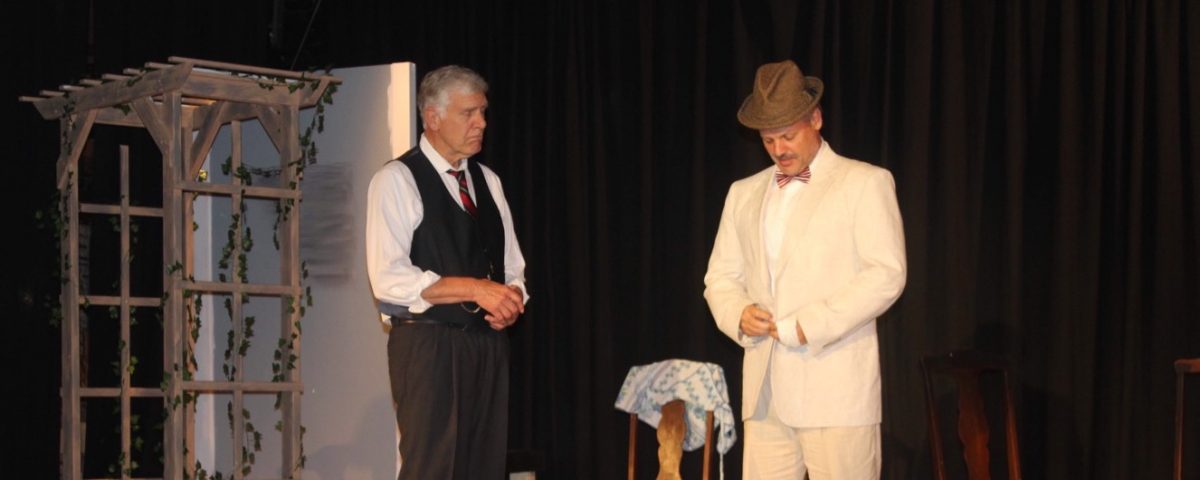Board Member Spotlight: Peter Stevens on Stepping Outside Your Comfort Zone
Board Member Spotlight: Peter Stevens on Stepping Outside Your Comfort Zone








Peter Stevens — Vice President of Oliverian’s Board of Trustees — recently took the stage in a community production of “Our Town.”
Board of Trustees Vice President Peter Stevens has over four decades of experience working in education. Prior to joining the board at Oliverian, he served as a Peace Corps Volunteer, worked as an English teacher, was school head at four schools in the U.S. and abroad, worked as the academic director at a therapeutic boarding school in Massachusetts, and spent about 12 years working as an independent educational consultant.
However, he didn’t have much experience onstage and in the spotlight — until this summer, when he took on the star role of Stage Manager in a production of Our Town. We caught up with Peter to ask about his time in the theater and his experience on the board.
Q: Can you tell us a little bit about your decision to try stage acting? What motivated you to pursue it?
A: I live in a small town in western Massachusetts called Shelburne. The town is celebrating its 250th birthday this year, so a local community theater company decided to put on a production of Thornton Wilder’s marvelous play Our Town. That’s a play I’d always loved, and many years ago, a good friend and colleague of mine played the role of stage manager, who is the narrator-conscience — and arguably the lead character — of the play. (The “stage manager” is a character in the play, not the traditional stage manager who’s behind the scenes.)
My wife Linn knew that I loved the part and love the play, and she realized that the production was holding auditions for the stage manager and suggested that I go and apply. So, I went in and did a reading with the director. After that, I went to England for a month to visit our kids and grandkids who live there, and I got an email that I’d gotten the role!
I took the part, but with considerable dread. The stage manager is way out of my comfort zone, and I’ve never done something like that before. I’ve always enjoyed drama and theater in school, as both student and teacher. But being onstage as an actor in front of a bunch of people was very different from the speaking before audiences that I’ve done. Memorizing countless lines was formidable!
But I stuck with it, and by September, there were five different performances over two weekends and we played to big crowds each night. I had a great time. And I was able to “live” this challenging role, dealing with matters of living and dying, meaning, fate, and eternal values. And (a bonus!) I met a lot more people in the town I live in, people who will be friends for a long time, It was an extraordinary experience.
Q: What else takes up your time and energy when you’re not onstage?
A: Much of my energy these days goes to several different volunteer boards, like the Oliverian board. I serve on one other school board, as well as the board of the local library, where we’ve just completed a capital campaign effort for renovations. I also serve a grass-roots foundation that raises funds to support teachers in local schools, as well as a committee that brings national speakers to the community to share thoughts on significant topics of importance, like election practices, prejudice and diversity, climate change, and social justice. Family, travel, and friends are all priorities.
Q: What do you enjoy about your involvement with Oliverian?
A: It’s so hard to find a brief response to that question. In general, the Oliverian experience allows young people to learn that they are somebody, they matter, people care about them, and they can try things, take risks, without prejudice. They can fail, and they’ll be picked up again. And, with redirection, will try anew.
I learned and shared much of that during the decade when I provided college counseling to Oliverian students, and worked with the academic program. Now that I’m on the board, I don’t work with kids directly anymore, although I do continue to work with some of the faculty. We do this work as trustees because we believe in what the school can offer young people. Oliverian provides an environment in which students can learn to understand that they’re important individuals with something to offer. Our role as a board is to help secure the school’s future, so, ever improving, Oliverian can help future students also “find their place in the world.”
